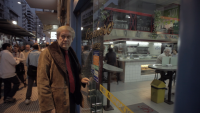 Translated by Capitol Hill Cubans
Translated by Capitol Hill Cubans
Roberto Alvarez Quinones is a Cuban journalist who spent over 25-years in Castro’s state-run Granma newspaper, as an economic commentator. He also served stints at the Cuban Central Bank and the Ministry of Foreign Trade.
By Roberto Alvarez Quinones in Diario de Cuba
The Castros do not want normalization, just the embargo lifted
The Castro brothers have always understood U.S. presidents and the intricacies of political power better than the Americans have comprehended the Cubans. In Washington they still can’t fathom why the two brothers and their military junta don’t want friendly and harmonious relations with the U.S., but rather for the embargo to be lifted, and to receive loans and tourists from the north with bulging wallets. Simple as that.
With the Venezuelan crisis deteriorating by the minute, an end to the embargo has become urgent for the Castro regime. But having politically cordial and normal relations with Washington is not in their best interest. Hence, they will do everything possible to prevent them, or to sabotage them, even if the “blockade” (a military term that has nothing to do with a unilateral trade embargo placed by one country on another) is lifted.
The dictatorial elite’s view is that “too much” rapprochement with the US would generate great internal and external trouble, as it would mean “betraying” its history as an anti-American leftist leader in Latin America. But, above all, it could undermine the regime’s Orwellian control over all of Cuban society. People on the island feel would be less fearful of demanding more freedoms if the “Empire” were a strong ally.
The gerontocracy of “historical” commanders is not prepared – nor do they want to be – to grapple in a civilized way with the political, ideological, economic, cultural and psychological “contamination” that could spring from a close relationship with the U.S. The training of the Castro regime’s nomenklatura has always been based on the opposite: visceral confrontation with the “imperialist enemy.”
Castro’s Manifest Destiny
In reaction to U.S.-made rockets fired at a farmer’s house in the Sierra Maestra by Batista dictatorship aircraft on June 5, 1958, Fidel Castro wrote a letter to Celia Sánchez setting forth the Manifest Destiny of his revolution: “When this war is over, for me a much longer and greater war shall begin: that which I will wage against them. I realize that this will be my true destiny. ”
That war did not end with the reopening of embassies in Havana and Washington. And it will not end as long as the island is ruled by Castro and the commanders who joined the anti-U.S. crusade conceived by their leader. There will be no close relationship between Cuba and the United States until there is a new “de-ideologized” political leadership on the island.
Feature continues here: Castros Despise Normalization




